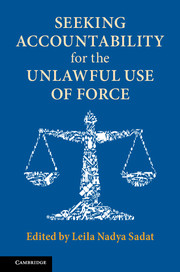Book contents
- Frontmatter
- Dedication
- Contents
- Notes on Contributors
- Foreword
- Preface
- Table of Cases
- Introduction
- PART I HISTORIC AND CONTEMPORARY PERSPECTIVES ON THE UNLAWFUL USE OF FORCE
- PART II MECHANISMS FOR RESTRAINING THE UNLAWFUL USE OF FORCE AND ENHANCING ACCOUNTABILITY
- 7 Commissions of Inquiry and the Jus ad Bellum
- 8 The International Court of Justice and the Use of Force
- 9 The Other Enemy: Transnational Terrorists, Armed Attacks, and Armed Conflicts
- 10 Toward the Substantive Convergence of International Human Rights Law and the Laws of Armed Conflict: The Case of Hassan v. the United Kingdom
- 11 International Law on the Use of Force: Current Challenges
- PART III THE ILLEGAL USE OF FORCE AND THE PROSECUTION OF INTERNATIONAL CRIMES
- PART IV IMAGINING A BETTER WORLD
- Epilogue
- Index
10 - Toward the Substantive Convergence of International Human Rights Law and the Laws of Armed Conflict: The Case of Hassan v. the United Kingdom
from PART II - MECHANISMS FOR RESTRAINING THE UNLAWFUL USE OF FORCE AND ENHANCING ACCOUNTABILITY
Published online by Cambridge University Press: 21 May 2018
- Frontmatter
- Dedication
- Contents
- Notes on Contributors
- Foreword
- Preface
- Table of Cases
- Introduction
- PART I HISTORIC AND CONTEMPORARY PERSPECTIVES ON THE UNLAWFUL USE OF FORCE
- PART II MECHANISMS FOR RESTRAINING THE UNLAWFUL USE OF FORCE AND ENHANCING ACCOUNTABILITY
- 7 Commissions of Inquiry and the Jus ad Bellum
- 8 The International Court of Justice and the Use of Force
- 9 The Other Enemy: Transnational Terrorists, Armed Attacks, and Armed Conflicts
- 10 Toward the Substantive Convergence of International Human Rights Law and the Laws of Armed Conflict: The Case of Hassan v. the United Kingdom
- 11 International Law on the Use of Force: Current Challenges
- PART III THE ILLEGAL USE OF FORCE AND THE PROSECUTION OF INTERNATIONAL CRIMES
- PART IV IMAGINING A BETTER WORLD
- Epilogue
- Index
Summary
INTRODUCTION
The question of which legal rules should govern modern armed conflicts remains highly relevant and much discussed. As armed conflicts evolve it requires constant reconsideration. For years the focus has been on the clarification and dynamic interpretation of the laws of armed conflict and their enhanced implementation rather than any form of legislative norm development. Ongoing discussions over the implementation of a new law of armed conflict monitoring mechanism, the International Committee of the Red Cross's (ICRC) current project of updating the Commentaries on the Geneva Conventions and their Additional Protocols, as well as an inflation of (nonbinding) experts manuals, codes of conduct, and norm-clarification processes, are all testament to this reality. Yet, ever since it has come to be accepted that international human rights law continues to apply in times of armed conflict, the question of which legal rules should govern modern armed conflicts is also addressed in the guise of “clarifying” the relationship between the law of armed conflict and human rights law. This project, which in its scope and potential impact exceeds conventional clarification processes, largely falls on the judiciary – stretching the role of courts in terms of normmodification and norm-development to its limits (and arguably beyond).
Of course, for as long as the focus was still primarily on the separation of the laws of war and the laws of peace there was not much of an issue. Even after the International Court of Justice's (ICJ) Nuclear Weapons Advisory Opinion it seemed as if the interplay between the law of armed conflict and human rights law could be determined in a rather straightforward manner and with near-arithmetic precision on the basis of a simple formula (lex specialis) that would help to keep the two legal regimes separate and to determine which of them prevails in a given case. Over time, however, the focus shifted from separation toward increasing complementarity and mutual reinforcement. This necessitated more complex interpretive processes. As a result the lex specialis standard was increasingly criticized and its utility cast into doubt. Gradually and subtly the original black-and-white approach of asking which of the two legal regimes (or individual provisions thereof) should prevail started to give way to interpretive approaches aimed at harmonization and even substantive convergence.
- Type
- Chapter
- Information
- Seeking Accountability for the Unlawful Use of Force , pp. 252 - 272Publisher: Cambridge University PressPrint publication year: 2018



